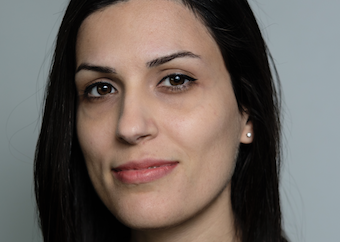
NSERC Postdoc Fellowship for Hasti Seifi
- 09 February 2018
- Stuttgart
- Haptic Intelligence
Dr. Hasti Seifi receives a prestigious Postdoctoral Fellowship from the Natural Sciences and Engineering Research Council (NSERC) of Canada, the country´s federal funding agency for university-based research and student training in natural sciences and engineering.
The NSERC Postdoctoral Fellowship is awarded annually with the aim to provide support to a core of the most promising Canadian researchers at a pivotal time in their careers. With this program, Canada's federal funding agency also aims to secure a supply of highly qualified Canadians with leading-edge scientific and research skills for local industry, government and universities.
"I feel truly honored to receive this postdoctoral fellowship", says Dr. Hasti Seifi, who is originally from Iran and is a permanent resident of Canada. "It means a lot to me, and it will help me continue the research that I have already started in Stuttgart". Since July 2017, Ms. Seifi has been working with Dr. Katherine J. Kuchenbecker as a postdoctoral scientist in the Haptic Intelligence Department at the Max Planck Institute for Intelligent Systems. She applied for the NSERC fellowship just a few months after starting her research position in Stuttgart.
Dr. Seifi will receive 45,000 Canadian Dollars per year for two years and - since she received her doctorate from a Canadian university, the University of British Columbia - she can hold her fellowship outside of Canada, at a university or research institution abroad. The NSERC encourages award holders to broaden their research experience by gaining exposure to different research environments. Ms. Seifi chose the Max Planck Institute for Intelligent Systems (MPI-IS) in Stuttgart, as Dr. Kuchenbecker is a distinguished expert in Haptography, the science of capturing and recreating the sense of touch. "Dr. Kuchenbecker´s research area has been very interesting to me. During my PhD, I got familiar with her work through her team's papers at haptic conferences and her research talks, so I wanted to do my postdoc with her", Ms. Seifi explains. "Another reason is that the Max Planck Society with its many different Max Planck Institutes is a world-renowned, highly prestigious research institution, and continuing my studies there will help me in my career. I was honored when Dr. Kuchenbecker let me join her team."
Dr. Seifi works on different projects at the MPI-IS. One is training novice surgeons in minimally invasive surgery to automate the assessment of how well they perform and provide feedback to them to correct their mistakes. "We attach sensors to the tools surgeons use, then track their motion and analyze how well they did in their training with machine learning techniques." Ms. Seifi did her PhD in haptic human-computer interaction under the supervision of Karon E. Maclean, a Professor in the Department of Computer Science at the University of British Columbia in Vancouver. Dr. Seifi's doctoral research centered on user perception of vibrotactile sensations. Specifically, she devised effective mechanisms and tools for users to personalize vibrations in mobile and wearable scenarios, for example enabling one to create buzz notifications that are more expressive and personally meaningful than the standard ones available in today's phones.
Dr. Hasti Seifi earned her masters degree in Human-Computer interaction in 2010. In April of 2017, she received her Ph.D. and then joined Dr. Kuchenbecker´s team in Stuttgart in July of the same year. She is 32 years old.
haptography
science
haptic


